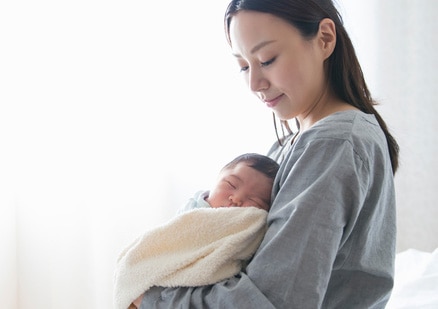During your stay

In our Family-Centered Postpartum Unit, you’ll stay in a private room with a private bathroom and shower, a flat-screen TV, free Wi-Fi, and phone. There will also be a rocking chair, dinette, and a pull-out bed for your partner or support person. One adult support person may stay with you throughout your hospital stay.
Your nurse will help you get comfortable caring for your newborn, and support you through umbilical cord care, diapering, bathing, swaddling, and breastfeeding. When you’re ready to go home, you’ll receive a diaper bag and a gift for the mother.
Meals and snacks
Meals and snacks are provided during your stay — order healthy food from a menu whenever you’re hungry. Meals featuring fresh produce are made to order by our chefs and delivered to your room. Your family and friends are welcome to visit our cafeteria, Blue Sky Bistro — on the basement level — for snacks and meals.

Your new baby is something to celebrate! A special celebration lunch or dinner is our gift to you and your partner. This fine-dining meal is served with sparkling cider in a fluted glass. Cheers to you and your growing family!
Rooming in
Research shows that babies who stay in the same room as their mothers adjust better, and new moms rest and recover better. We keep your baby with you as much as possible throughout your stay, so you can bond and learn to recognize your baby’s needs.
Hand-washing
As your new baby’s immune system develops, hand-washing is an important way to prevent infection. Protect your newborn by asking visitors to wash their hands before touching your baby. If anyone is sick — even mildly — ask them not to visit until they are feeling better.
Newborn photos
A photographer is available for hire to take photos of your baby, from birth and after you go home. Ask your nurse for more information.
Newborn security
Your baby’s security is important to us. Never leave your baby unattended. If you need to be away from your baby for any reason, let your nurse know so we can make sure your little one is safely cared for.
After your baby is born, you, your baby, and your partner will receive matching wrist bands. A wireless radio frequency band will be placed on your baby’s ankle to make sure he or she remains in the mother-baby unit, which is also equipped with security cameras.
Your baby will stay with you in your room unless there is a medical reason for your newborn to be in the NICU.
All Kaiser Permanente employees wear badges with their name, title, and photograph. Hospital employees with privileges to care for newborns have a red stripe along the bottom of their badge. Only allow staff with this red stripe to take your baby from your room for any reason.
If you’re ever uncomfortable with the person who is asking to take your baby from you, use your nurse call button to ask for an additional staff member to confirm the request.
Newborn screenings
All newborns undergo painless cardiac and hearing screening tests. The hearing test is performed by a newborn hearing screening technician and the cardiac test, which looks at your baby’s heart health, will be performed by your nurse. These tests will be done in the postpartum unit before you go home.
Breastfeeding
Breast milk is nature’s perfect first food, and breastfeeding can enhance the bond between you and your baby. The American Academy of Pediatrics recommends exclusive breastfeeding for 6 months and continued breastfeeding through the first year of life.
Learn more about breastfeeding >
Support for successful breastfeeding:
- The “Breastfeeding with Success” class will help you learn about breastfeeding positions, milk supply, preventing and managing pain, pumping, milk storage, and working while breastfeeding.
- We encourage skin-to-skin contact, which triggers healthy baby behaviors. It helps your little one stay warm on their own, breathe on their own, and learn to nurse.
- All of our labor and delivery and postpartum nurses are trained breastfeeding specialists. We also have a team of internationally board-certified lactation consultants at our hospitals and outpatient breastfeeding clinics.
- 24-hour breastfeeding advice line: 1-888-576-6225
Lactation consultants
If you need additional support, a lactation consultant will come to help you while you’re in the hospital. Lactation consultants are also available after you go home. Call one of the MILC numbers below for an appointment.
Mothers and Infants lactation counseling (MILC)
Lactation clinic:
West los angeles medical center
6041 Cadillac Ave.
Room 446, 4th Floor (East Tower)
Los Angeles, CA 90034
Get directions
To contact a lactation consultant, call 323-857-4121.
Leaving the hospital
After you have your baby, you’ll be seen daily by a midwife or obstetrician who will care for you during recovery and help determine when you’re ready to go home. The length of your hospital stay will depend on a variety of factors.
If you have a vaginal birth, you may be ready to go home when your baby is 1 day old. If you have a cesarean birth, you’ll need to stay a bit longer.
A board posted in your room lists all the things that need to happen before you’re discharged. On the day you leave the hospital, we’ll try to complete the discharge process in the morning so you can get home and settled in for that first night on your own with baby.
Secure checkout
When you’re ready to leave, your support person should bring the car up to the front of the hospital where you may have entered in labor. A staff member will wheel you and your baby downstairs after you’ve gone through our secure checkout.
Car seat
California law requires that you take your baby home in a car seat. Our staff is not licensed to assist or direct you with car seat usage or installation, so we encourage you to take our “Infant Safety and CPR” program before your baby is born. It also helps to have your car seat installed a few weeks before your baby is due.
Car seat installation resources
Always read and follow the car seat instructions, as well as your vehicle seat belt instructions. You can find guidelines for safe car seat installation online.